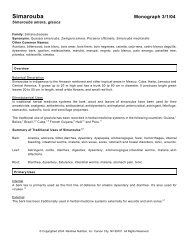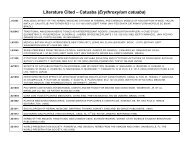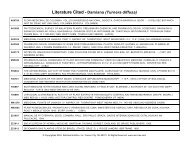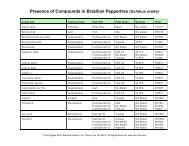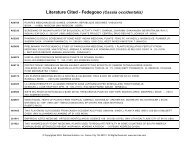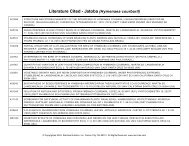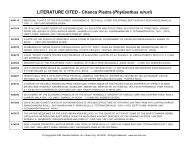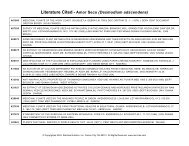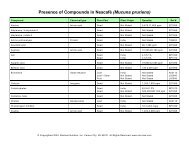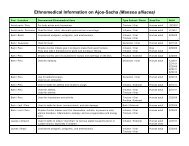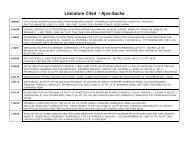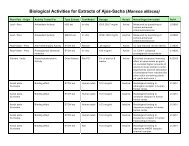Organ Specific Guide - Raintree Nutrition, Inc
Organ Specific Guide - Raintree Nutrition, Inc
Organ Specific Guide - Raintree Nutrition, Inc
Create successful ePaper yourself
Turn your PDF publications into a flip-book with our unique Google optimized e-Paper software.
AMAZON HEART SUPPORT<br />
Description: A synergistic formula of rainforest botanicals traditionally used in South America for the heart.<br />
Traditional uses by organ or system: Cardiovascular: For hypertension.<br />
Ingredients: A proprietary blend of Brazilian peppertree (Schinus molle), abuta (Cissampelos pareira),<br />
chanca piedra (Phyllanthus niruri), picão preto (Bidens pilosa), erva tostão (Boerhaavia diffusa), mulungu<br />
(Erythrina mulungu), graviola (Annona muricata), and mutamba (Guazuma ulmifolia).<br />
Suggested Use: Take 2-3 capsules twice daily (depending on body weight).<br />
Contraindications:<br />
• Not to be used during pregnancy or while breast-feeding.<br />
• Plants in this formula have been documented to reduce blood pressure. It is contraindication in people<br />
with low blood pressure.<br />
Drug Interactions: May enhance the effect of diuretic, ACE-inhibitor, antihypertensive, and cardiac depressant<br />
medications.<br />
Other Practitioner Observations and Possible Precautions:<br />
• Several plants in this formula have various actions on heart function, including reducing heart rate and<br />
having a cardiac depressant effect. Those with bradycardia, or those on medications to depress heart<br />
function and heart rate should be monitored more closely.<br />
• Several plants in this formula have a hypoglycemic effect. Individuals with hypoglycemia should monitor<br />
their blood sugar levels when taking this formula.<br />
Synopsis of research: (Please the online Tropical Plant Database for all cited research.)<br />
• Brazilian peppertree is traditionally used in South America for hypertension, arrhythmia, and as a<br />
cardiotonic. In laboratory studies with rats and dogs Brazilian peppertree was shown to evidence a<br />
hypotensive effect.<br />
• Abuta has been reported with hypotensive actions in animal studies over the years. Abuta contains<br />
several cardioactive alkaloids including tetrandrine and berberine, which have shown in research to have<br />
a hypotensive effect through numerous pathways and mechanisms of action.<br />
• Chanca piedra’s hypotensive effects were first reported in a dog study in 1952 (in which a diuretic effect<br />
was noted also). The hypotensive effects were attributed to a specific phytochemical in chanca piedra<br />
called geraniin in a 1988 study. In 1995 Indian researchers gave human subjects with high blood pressure<br />
a chanca piedra leaf powder in capsules. They reported a significant reduction in systolic blood<br />
pressure, and a significant increase in urine volume and sodium excretion in all subjects.<br />
• Picão preto was documented to prevent hypertension in rats fed a high-fructose diet, and to lower the<br />
resulting (elevated) blood pressure and triglyceride levels. In hypertensive rats (including high dietary<br />
salt-induced hypertension), picão preto significantly lowered blood pressure—without having an effect<br />
on heart rate and urine volume. A leaf extract was also shown to have smooth-muscle relaxant activity<br />
on the heart.<br />
• In clinical studies with animals, erva tostão demonstrated smooth muscle and skeletal muscle stimulant<br />
activities in frogs and guinea pigs; anti-inflammatory actions in rats; and hypotensive actions in dogs as<br />
well as in vitro hypotensive actions.<br />
• Mulungu's hypotensive and heart-regulatory activities were studied and attributed to its alkaloids.<br />
• Graviola has demonstrated hypotensive, vasodilator, and cardiodepressant activities in various animal<br />
studies over the years.<br />
• In the first study published on mutamba which used various animals (rats, rabbits, guinea pigs, cats and<br />
insects), researchers reported that it lowered heart rate and blood pressure, relaxed smooth muscles and<br />
stimulated the uterus.



